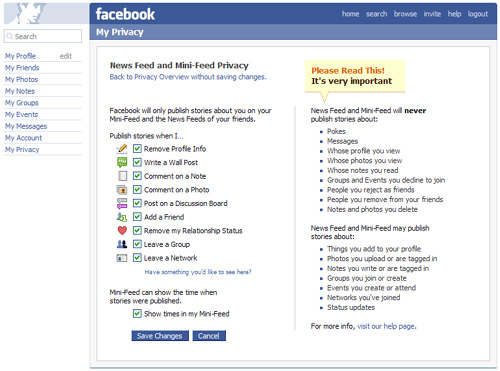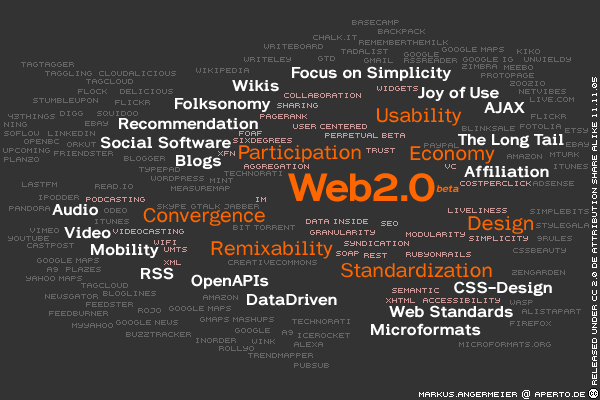 Just weeks after Facebook signed a hastily-prepared Microsoft ad deal and went super-stalker on its users by trying to enter the big scene with new high-scale features, it's going as far as to consider selling to Yahoo!. Apparently a sale has been on the cards for a while although it's the first I'd heard of it.
Just weeks after Facebook signed a hastily-prepared Microsoft ad deal and went super-stalker on its users by trying to enter the big scene with new high-scale features, it's going as far as to consider selling to Yahoo!. Apparently a sale has been on the cards for a while although it's the first I'd heard of it.
It's not entirely surprising news: all the little kids sell out when they get big. But as a Facebook user I'm concerned that our tidy little Facebook home will soon become an ad-infested portal full of 'entertainment', 'health' and 'gossip' vermin with the Yahoo! logo plastered all over it.
Sad, sad.

So Tony Blair finally decided to announce he'll leave within the next 12 months. Well, aside from the fact that I have ceased to care about Britain's politics because I'll be getting out of this place as soon as I can set roots in a friendlier country, here's a thought for you:
"I think it's important for the Labour Party to understand and I think the majority of people in the party do understand, that it's the public that comes first and it's the country that matters and we can't treat the public as irrelevant bystanders in a subject as important as who is their PM. So we should just bear that in mind in the way we conduct ourselves in the time to come. And in the meantime I think it's important that we get on with the business."
But we can treat the public as irrelevant bystanders in a subject as important as a war? And another one? How about peerages for cash? Or identity cards?
I guess who we choose as our dictator is more important than all those things. I guess Tony Blair is more important than all those things. Sarcasm.
And as for my 'getting out of this place', here is a letter sent in to El Reg this week, which resonates very well with me:
Is it just me or is this country fast becoming a fascist police state? What with the government wanting to fingerprint our kids, give us all ID cards, bugging our bins, tracking our cars, videoing our every move, introducing racial profiling and sharing our private data to all and sundry. All this in the name of keeping us safe from the evil armies of terrorists and paedophiles and asylum seekers lurking behind every tree, ready to destroy our civilisation and sodomise our grandparents at a moments notice… an obvious excuse exaggerated to keep all the Sun readers towing the party line. Am I the only person giving serious thought to finding somewhere else to live before Group 4 open their first death camp? …Would the last freedom loving person leaving the UK please turn out the lights… Marcus
Amen.
 I'm getting a little bored with a certain unnamed corporation using its leverage to manipulate its customers. Just like I'm fed up with the on-going patents fiasco with stupidly broad applications being filed (and in some cases, accepted), except I can't be bothered to comment on that one.
I'm getting a little bored with a certain unnamed corporation using its leverage to manipulate its customers. Just like I'm fed up with the on-going patents fiasco with stupidly broad applications being filed (and in some cases, accepted), except I can't be bothered to comment on that one.
So anyway, that unnamed corporation (Microsoft) is getting noticed for its current policy of not limiting Critical Updates material to actual critical updates.
First they rolled-out their anti-piracy tool Windows Genuine Advantage as a high-priority security update. This was purely for their own gains as it really doesn't provide any security whatsoever, and it certainly doesn't patch any security vulnerabilities in the classical sense.
The tool effectively converted unlicensed copies of Windows XP into shareware by plastering registration notices all over the logon screens and the Desktop. It's probably a tenuous argument to suggest that pissing off the pirate community is cause to moan at the firm, but here Redmond is seen to abuse the trust with which users "allow" it to download any software it likes under the guise of that well-known Microsoft facet, security. (And yes, it is annoying.)
Legal Windows users probably didn't care much about that, branding the WGA tool "a good thing" and not saving any thought time for the trust issue. But then it went on.
As Techdirt reports:
When a circumvention technique was discovered for its PlaysForSure DRM, the company immediately rushed out a patch, which it labelled as 'critical', not even waiting for Patch Tuesday. Of course, most people wouldn't be inclined to install a patch that prevented them from enjoying their music as they saw fit, but most people wouldn't question Microsoft when it says a patch is critical, either.
And now IE7 will be hurried out as a "High Priority security update".
Well, besides the fact that that is just plain wrong, what about people who don't want to install IE7? Maybe because [it sucks, or because] they use an alternative browser? And let's face it, it's a user's choice… at least according to the world outside one little town in Washington.
Presumably users who don't want to install IE7 for whatever reason or another will be repeatedly shouted at for "forgetting to install a critical update" when they go onto Windows Update, only to find that it's only a web browser. What about Automatic Update? A browser potentially updated to a new major revision with some incredibly intense GUI changes without so much as a prompt?
We all know Microsoft never really considered that a user's Windows PC belongs to anyone but Microsoft, but to leverage a consumer's faith in allowing security updates to be delivered to their system into throwing a new browser (which, incidentally, comes with an MSN Search box as standard) is… evil.
I don't know how many more ways I can say it. It annoys me. Microsoft's attitude to corporate control of information delivery and top-down provision of services goes against the grain of where intelligent netizens are looking to be taken.
They wonder why MSN's 'success' pales in comparison to Google's: I hold that Redmond's insistence upon including all manner of gossip-magazine-style crap around the edges puts people off, whereas Google Search is just a search engine: which is, after all, what someone wants when they type in the URL to a search engine. MS don't seem to understand the intelligent consumer market.
And no, I won't switch to Linux. All the applications I want are on this platform and to be honest I couldn't see myself sitting in front of a shell window all day. I want to use Windows… but I want Windows to be good. And I want Microsoft to be a lot less arrogant about how it uses its dominant market position.
Earlier in the week I reported on the extensive changes to Facebook which had a huge proportion of people – in numbers heading towards a million – up in arms.
Well, it seems the continued outrage (even after Mark Zuckerberg tried to explain) and growing online media coverage forced the creators of the social networking service to re-think their ways. And, in my opinion, they did exactly what they should have done in the first place: given the user control. So far as I can tell today, it ought to keep everyone happy.
Many proponents of the changes attacked the rioting users for demanding too much control from a 'service', whilst the latter group of people expected full control of their personal information by default. I'd say this possibly points to the way in which the general web population is becoming increasingly familiar with "contribution sites": websites which are built fundamentally around the concept of user contribution.
Easy compromise finally implemented
Either way, the correct steps seem to have finally been taken. As explained on a very prominent blog post (which actually sits atop each user's Facebook homepage for the time being), the Facebook team has made available to users complete control over which bits of information from their profile are included in their friends' Feed summaries.
When we launched News Feed and Mini-Feed we were trying to provide you with a stream of information about your social world. Instead, we did a bad job of explaining what the new features were and an even worse job of giving you control of them.
We made the site so that all of our members are a part of smaller networks like schools, companies or regions, so you can only see the profiles of people who are in your networks and your friends. We did this to make sure you could share information with the people you care about. This is the same reason we have built extensive privacy settings — to give you even more control over who you share your information with.
Somehow we missed this point with Feed and we didn’t build in the proper privacy controls right away. This was a big mistake on our part, and I’m sorry for it. But apologizing isn’t enough. I wanted to make sure we did something about it, and quickly. So we have been coding nonstop for two days to get you better privacy controls. This new privacy page will allow you to choose which types of stories go into your Mini-Feed and your friends’ News Feeds, and it also lists the type of actions Facebook will never let any other person know about.
Those who were fed up of the constant whining from opponents of this week's service changes may be upset that the post admits "we really messed this one up" and terms the problems "errors", since a popular argument seemed to be that any such changes to a service is just part of life and should be accepted at Face value. The phrases used by Zuckerberg basically amount to admitting that Facebook is and should be run as a collaborative tool, rather than a top-down service.
However, I'm sure the 742,400 current members of the group "Students against Facebook News Feed (Official Petition to Facebook)" will be all but unanimously necking an extra alcoholic beverage this fine Friday evening in celebration.
Here's a screenshot of the new privacy page:

Although it's a happy day indeed for all those for whom this addresses serious reservations about ever using Facebook again (and let's face it, that's life-altering change for hundreds of thousands of people with nothing better to do, including myself), this week's arguments did raise some points worth bearing mention.
To start with, the issue of privacy, and perhaps more predominantly customer confidence in privacy, has again been highlighted as being underestimated by increasingly popular websites. Google keeps coming out with new, interesting ideas that are just waiting for someone to sue out of privacy concerns. Google tries to ignore them; will Facebook learn from them?
Although in this case we're glad that there was an easily-reachable middle ground that provided the 'neat' functionality that the creators were striving for but also addressed major confidence issues, perhaps this will only be the first example in a long line of cases where the question of 'service or collaboration tool' splits the Internet community right down the middle.
 As summarised nicely in this article at Techdirt, Facebook continued its ongoing program of development with some rather extreme changes this week.
As summarised nicely in this article at Techdirt, Facebook continued its ongoing program of development with some rather extreme changes this week.
The new bizarrely-named 'Feed' (which has nothing to do with RSS or Atom or XML at all) is the replacement of the default "you've just signed in" homepage, which lists every move/edit/action taken by your friends in recent days. This includes new wallposts (profile comments), added photos, information added/removed from their profile and newly created friendships.
For example, in the past someone might have changed their "Relationship Status" from 'In A Relationship' to 'Single' and no-one would really have noticed that it changed. Sure you could see that it was now 'Single', but you'd have to be looking for it to know that it had changed.
Now, your name will show up on all your friends' Feeds as "Tom is now single".
Understandably, this has freaked a lot of people out, with 532,000 members in the group entitled "Students against Facebook News Feed (Official Petition to Facebook)". By comparison, self-titled and possibly previously accurate "The biggest Facebook group ever" has only 218,000 members, and has been in existence for months. The petition group was started just days ago.
Privacy violation? Or just better bait for Big Brother behaviour?
 A common defense of the new features, heard in reply to every correspondence to the Facebook team, is that no more information is given out than was previously available. Some over-zealous Facebook users have been naming Facebook "stalker-friendly" and crying "privacy violation" which is not technically true, as indeed there is no more information being released than is provided by the user and individual Feed items are only visible to people who already have access to the relevant profile.
A common defense of the new features, heard in reply to every correspondence to the Facebook team, is that no more information is given out than was previously available. Some over-zealous Facebook users have been naming Facebook "stalker-friendly" and crying "privacy violation" which is not technically true, as indeed there is no more information being released than is provided by the user and individual Feed items are only visible to people who already have access to the relevant profile.
But everyone seems to be forgetting that, in the information age it's not just what data you publish, it's how you publish it.
Whereas before, things like photo additions and status changes could be tracked by a friend with a piece of paper, they weren't announced. Now a user's every move is listed in a chronological fashion, and this is scary. Whether you're the sort of person who accepts change easily, or not.
Still, at least before the story finally started to do the blogosphere rounds this morning, the Facebook staff were keen to tell complaining site users that they were wrong.
We think, however, that once you become familiar with the new layout and features, you will find these changes just as useful as past improvements such as Photos, Groups, and the Wall.
(by email correspondence)
Ignoring for a moment how frustrating it is to be told how we will think in time, it's a widely held belief this week that no matter what Facebook's opinion, it's the customers' immediate needs that should be met: especially with Facebook making a bucket off advertising deals, fueled solely by the loyalty and/or addiction of the core users.
Meanwhile, a huge outcry ensues, with people removing themselves from various Groups and streamlining their profiles to thin out the information advertised. Perhaps it's a blessing in disguise that people are being forced to realise how easy it is to learn everything about your life from your Facebook profile.
After all, the Feed just automates what could already be done manually, and although maybe it should be retired as "too stalker friendly", there was never anything to stop people gawking through friends' profiles anyway: especially when many users add as friends mere acquaintances or people who live in the same residence, and when the privacy settings are largely opt-in rather than opt-out.
Maybe this is the kick in the head that Facebook users need to remind them to be careful what they write online: because as we know, free speech online is an ever more dangerous thing.
 I make no secret of my appreciation for what NASA do. Some people attack them for pushing the envelope of discovery way beyond practical human ability whilst we still don't know everything about our own planet. Well, apparently NASA don't know everything about their own projects: specifically the $2b space shuttle orbiters.
I make no secret of my appreciation for what NASA do. Some people attack them for pushing the envelope of discovery way beyond practical human ability whilst we still don't know everything about our own planet. Well, apparently NASA don't know everything about their own projects: specifically the $2b space shuttle orbiters.
Marred this month by exteme bad luck on counts of badly designed antenna bolts the weekend before the planned August launch, a tropical storm, a lightning strike, a partial rollback to hangar and now electrical failures just hours from T minus zero, one wonders how NASA could ever have claimed to be ready for this mission.
I don't know if it's just that the media eyes are on the project in the run-up to launch but there do seem to be an alarming number of repairs that take place on the orbiters even two days before launch.
Meanwhile, with this electrical issue, NASA says that when the mission managers switched the fuel cells on, one malfunction caused a voltage spike in the other two. For a launch all three must be working. Apparently "the Shuttle could launch without the problem being fixed, but that engineers wanted to understand it properly."
And yes, they mean exactly that. The engineers do not understand the problem.
Worse than that:
Adding to an already complicated situation is the fact that NASA doesn't know exactly how the fuel cell works, ABC reports.
"The vendor sold us the thing [in 1976] and didn't exactly tell us how it works, amazing as that might be," Hale said.
Even I'm starting to lose my confidence in that particular organisation. It sounds like they've stolen shuttle parts from alien technology and not even bothered reverse-engineering it. Oh, there's a conspiracy theory waiting to happen.. I wonder if "the vendor" happened to be based in Tenerife in 1976…
My friend Dagger pointed me to http://www.designerwiz.com/nojava.htm and the confusion there. They were redirecting users who had Java disabled to a page all about enabling Java, even though what they really meant was Javascript. They didn't seem to realise the difference.
The same page explained that their site wouldn't work in a whole bunch of browsers, seemingly resigning to defeat and not appreciating that IE is mostly wrong when it's the only browser to 'correctly' render a webpage. All this from a site on Javascript snippets. Disturbing.

Image 1
Once I'd taken a look I couldn't help but slag them off by email. They only have a web-based help ticket system by way of contact options, but that didn't stop me.
And I wasn't very nice.
My definition of Web 2.0: comments please.
Web 2.0 is a marketing-driven buzzword to describe the way in which the Internet (or more specifically the World Wide Web) has become collaborative. That is, whereas in the past content was generally published and remained static for download by people for informational purposes, it has developed into a system whereby the user can contribute to the website in a fundamental way. The best examples of these are Wikis, openly editable encyclopedias where user-contributed content fuels the entire medium, blogs to which anybody can post a comment and Flikr which is a photo-sharing site. The entire purpose of these sites is to collect end-user input and display it in an organised fashion. There was no sudden 'change to Web 2.0' and it isn't a technological change per se, rather a culmination of years of development where websites have gone from static pages of content, through to dynamic online shops, catalogues and forums and finally to this point at which website visitors are often as responsible for generating the website content as the website owner.
Gracias.
 Just weeks after Facebook signed a hastily-prepared Microsoft ad deal and went super-stalker on its users by trying to enter the big scene with new high-scale features, it's going as far as to consider selling to Yahoo!. Apparently a sale has been on the cards for a while although it's the first I'd heard of it.
Just weeks after Facebook signed a hastily-prepared Microsoft ad deal and went super-stalker on its users by trying to enter the big scene with new high-scale features, it's going as far as to consider selling to Yahoo!. Apparently a sale has been on the cards for a while although it's the first I'd heard of it. So Tony Blair finally decided to announce he'll leave within the next 12 months. Well, aside from the fact that I have ceased to care about Britain's politics because I'll be getting out of this place as soon as I can set roots in a friendlier country, here's a thought for you:
So Tony Blair finally decided to announce he'll leave within the next 12 months. Well, aside from the fact that I have ceased to care about Britain's politics because I'll be getting out of this place as soon as I can set roots in a friendlier country, here's a thought for you: I'm getting a little bored with a certain unnamed corporation using its leverage to manipulate its customers. Just like I'm fed up with
I'm getting a little bored with a certain unnamed corporation using its leverage to manipulate its customers. Just like I'm fed up with 
 A
A  I make no secret of my appreciation for what NASA do. Some people attack them for pushing the envelope of discovery way beyond practical human ability whilst we still don't know everything about our own planet. Well, apparently NASA don't know everything about their own projects: specifically the $2b space shuttle orbiters.
I make no secret of my appreciation for what NASA do. Some people attack them for pushing the envelope of discovery way beyond practical human ability whilst we still don't know everything about our own planet. Well, apparently NASA don't know everything about their own projects: specifically the $2b space shuttle orbiters.
